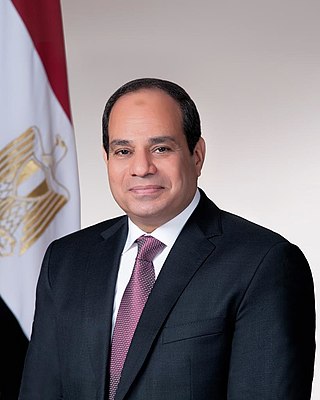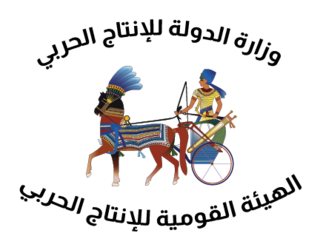
The Egyptian Armed Forces are the military forces of the Arab Republic of Egypt. They consist of the Egyptian Army, Egyptian Navy, Egyptian Air Force and Egyptian Air Defense Forces.

Cairo University is Egypt's premier public university. Its main campus is in Giza, immediately across the Nile from Cairo. It was founded on 21 December 1908; after being housed in various parts of Cairo, its faculties, beginning with the Faculty of Arts, were established on its current main campus in Giza in October 1929.

Heliopolis was an early 20th century suburb outside Cairo, Egypt, which has since merged with Cairo and is administratively divided into the districts of Masr El Gedida and El Nozha in the Eastern Area.
Cairo Metro Line 3 is a main east-west line of the Cairo Metro mass transit system in Greater Cairo, Egypt. After the opening of phase 3C, it will have a length of 34.2 km (21.3 mi) with 34 stations, where 29 stations have been built and operated in six phases between 2007 and 2024.
The Egyptian General Petroleum Corporation (EGPC) is a national oil company of Egypt. EGPC's business includes crude oil exploration, refining, and storage. The company also produces lubricants and greases and offers services for oil and gas projects.

Egypt's environmental problems include, but are not limited to, water scarcity, air pollution, damage to historic monuments, animal welfare issues and deficiencies in its waste management system.

The Supreme Council of the Armed Forces is a statutory body of between 20 and 25 senior officers of the Egyptian Armed Forces, and is headed by Field Marshal Abdul Fatah al-Sisi and Lieutenant General Mohamed Ahmed Zaki. The council is convened only in cases of war or great internal emergencies. As a consequence of the Egyptian Revolution of 2011, SCAF assumed power to govern Egypt from departing President Hosni Mubarak on 11 February 2011, and relinquished power on 30 June 2012 upon the start of Mohamed Morsi's term as president. The Council has met regularly in times of national emergencies. During the course of the 2011 revolution, the Supreme Council of the Armed Forces met first on 9 February 2011 under the chairmanship of Egyptian president, Hosni Mubarak. The Council met for the first time without the chairmanship of the president on the following day, 10 February, and issued their first press statement which signaled that the council was about to assume power which they did the following day after Mubarak's resignation. The military junta was headed by Field Marshal Mohamed Hussein Tantawi who served as the Minister of Defense under Mubarak, and included the service heads and other senior commanders of the Egyptian Armed Forces, namely Lt. Gen. Sami Hafez Anan, Armed Forces Chief of Staff; Air Marshal Reda Mahmoud Hafez Mohamed, Air Force commander; Lt. Gen. Abd El Aziz Seif-Eldeen, Commander of Air Defense; and Vice Admiral Mohab Mamish, Navy Commander in Chief.

Abd el-Fattah Saeed Hussein Khalil el-Sisi is an Egyptian politician and retired military officer who has served as the sixth and current president of Egypt since 2014. Before retiring as a general in the Egyptian military in 2014, Sisi served as Egypt's deputy prime minister from 2013 to 2014, minister of defense from 2012 to 2013, and director of military intelligence from 2010 to 2012. He was promoted to the rank of Field Marshal in January 2014.

Sedki Sobhy Sayyid Ahmad is an Egyptian politician and former General who was Minister of Defence of Egypt from 2014 until 2018. Sobhy previously served as the Chief of Staff of the Armed Forces from August 2012 to March 2014. He was sworn in as Minister of Defence in March 2014 after Abdul Fattah al-Sisi resigned so he could stand for the presidency. He also commanded the Third Army for a time.

The Sinai insurgency was an insurgency in the Sinai Peninsula, Egypt, that was commenced by Islamist militants against Egyptian security forces, which have also included attacks on civilians. The insurgency began during the Egyptian Crisis, during which the longtime Egyptian president Hosni Mubarak was overthrown in the 2011 Egyptian revolution.
In the late 1970s, President Anwar Sadat initiated neoliberal policies in Egypt. Following Sadat's assassination in 1981, President Hosni Mubarak came to power and continued the economic liberalization of Egypt.

The Chief of the General Staff of the Egyptian Armed Forces is second in command after the Minister of Defense and the President. He usually holds the second highest military rank. Commanders of the Navy, Air Force and Air Defense Forces are under his command.
The Rapid Deployment Forces (RDF) are one of the branches of the Egyptian Armed Forces. It was formed in March 2014 by the former defense minister field marshal Abdel Fattah al-Sisi. It was formed due to the increasing threat of terrorist organizations in Libya. It is mainly airborne troops with a special formation, and it is characterized by the ability to perform operations inside and outside the Egyptian mainland. It comprises the most efficient elements of the Sa'ka Forces, mechanized infantry, armored corps, air defense, artillery and anti-tank teams, it also includes military police, special reconnaissance teams, and a number of fighter jets.
The Suez Canal Corridor Area Project is a megaproject in Egypt that was launched on 5 August 2014 by President Abdel Fattah el-Sisi and was completed in 2015. The project aimed to increase the role of the Suez Canal region in international trade and to develop the canal cities of Suez, Ismailia, and Port Said.
Comprehensive Operation − Sinai 2018 is the code name of a large counter-terrorism campaign conducted by the Egyptian Armed Forces and the Interior Ministry. The operation was initiated on February 9, 2018, and focuses on northern and central Sinai and parts of the Nile Delta. It mainly targets Islamist insurgents, as well as "other criminal activity that affects national security and stability", according to the Armed Forces press statement that announced the start of the campaign.

The Jordanian Armed Forces Band is the main musical unit of the Royal Jordanian Army made up of musicians who perform in official settings usually in the presence of the Jordanian royal family. When performing, all band members wear red and white checked Keffiyehs alongside their full dress uniform. The band was established in 1921, with a core of 10 musicians who served with the Arab Army. In 1929, bagpipes from the area that is now Egypt and Syria were first introduced to the band. In 1982, Hussein of Jordan approved the use of the band for purely ceremonial purposes. Today, the full band is composed of over 500 musicians who are arranged in a similar fashion to the Bands of the Household Division.
The Medical Services Department of the Armed Forces and the Egyptian Army Medical Corps are the departments responsible for the hospitals and medical facilities of the Egyptian Armed Forces including the Army medical schools.

Egypt Vision 2030 is a national agenda launched in February 2016 by the Egyptian Government and unveiled by the Egyptian president Abdel-Fattah Al-Sisi. The vision consists of eight main national goals to be met by 2030 that are in line with the United Nations Sustainable Development Goals (SDGs), and the Sustainable Development Strategy for Africa 2063.

The National Authority for Military Production or National Organisation for Military Production (Egyptian Arabic: الهيئة القومية للإنتاج الحربي) is an Egyptian body with a legal personality affiliated with the Ministry of Military Production. It was established pursuant to Law No. 6 of 1984 to become one of the pillars of the military industry in Egypt through its supervision of military factories. It was previously called the (Egyptian General Organisation for Military Factories and Aircraft Industry) before changing to its current name.
The Egyptian Armaments Authority (EAA) is one of the bodies of the Egyptian Armed Forces, and was previously known as the Technical Authority.












